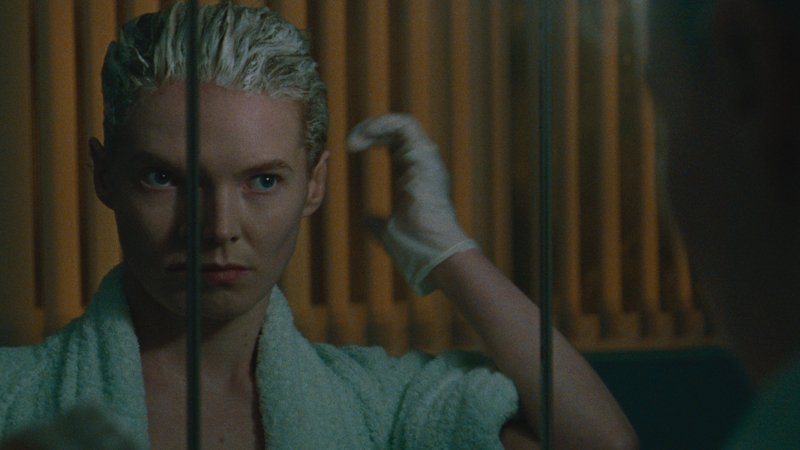It’s 1988 and Newcastle P.E. teacher Jean Newman (Rosy McEwen) is surrounded by noise. A naturally rather tense woman who needs relaxation tapes to sleep, the noise is breaking her down. It isn’t just random sounds, it’s the news of Thatcher’s Clause 28 the legislation that bans the “promotion of homosexuality” and the protests that surround it. It’s the noise of ‘Blind Date’ on the telly hosted by Cilla Black where men tell women exactly how they should act if they want to get a man. It’s the noise of music in a gay bar where she can relax for a moment and be herself. It’s the noise of her colleagues and their gossip. It’s the noise of her unapologetically queer girlfriend, Viv (Kerrie Hayes) who takes up spaces Jean is afraid to. It’s also the noise of silence – the silence that people say speaks louder than words, the silence that is deafening and defeating Jean as much as the rabble that she can’t keep out.
Georgia Oakley’s intimate character study of a lesbian teacher trying to find a way to inhabit her sexuality without losing other essential aspects of herself is a film that could be made right now and be pertinent. The rise of contemporary conservatism and the impact upon the queer community is being felt all over the world. Books are being banned. Teachers and public officials face dismissal. Anti-queer activists are taking to the streets and intimidating people. Drag has been banned in places. The world is regressing at an alarming rate. Oakley’s film might be set in 1988 during Thatcher’s hateful regime, but with the exception of some technology it could be right now.
Jean’s world is swathed in shades of blue. From her striking blue eyes, to the blues and greys of her wardrobe and the P.E. uniforms at her school. Even her car is blue. Oakley is playing with the concept on multiple fronts; the hues of the film provided by Soraya Gilanni’s production design and Victor Seguin’s cinematography, the engulfing depression that Jean is trying to ward off, and the reference to David Bowie’s song ‘Blue Jean’ – “She got a camouflaged face… Blue Jean can tempt me.”
Jean has internalised homophobia that partly comes from an unsupportive family, her sister Sasha (Aoife Kennan) knows she is gay but refuses to acknowledge it beyond how it inconveniences her and makes Jean untrustworthy. Her sister also insists on having a photograph of Jean on her wedding day in the house despite the fact Jean is divorced. Sasha and her irksome husband Tim hold the subtle threat over Jean that if she doesn’t conform around them, she will lose access to her beloved nephew Sammy. At school Jean fares little better. It’s clear that she loves her job and is quite a popular teacher with the students (being a particularly young member of the faculty) but she’s always watchful of herself especially around the Netball team that she coaches. She averts her eyes at every opportunity for fear that someone might suggest she’s looking at the girls. Her colleagues are curious about her because she doesn’t socialise with them. Jean is splitting her life in two – the time she spends with Viv and her friends, and every other aspect of her day to day.
Things get particularly complicated when a new student transfers to the school. Lois (Lucy Halliday) is visibly tomboyish and is picked as different by her peers, especially the bully Siobhan (Lydia Page). Jean is welcoming Lois into her classroom and trying to make things easier for her but is also afraid of what Lois represents. Lois refuses to bend to the bullying and refuses to quash the rumours that she’s a lesbian. At fifteen Lois is braver than Jean and when Lois turns up at the local Gay bar Jean realises that her distinct lives are on a collision course.
Oakley allows the audience to have sympathy for Jean but doesn’t endorse her actions, especially when she allows Lois to be suspended for something that the young woman wasn’t responsible for. Jean’s fear of exposure, especially by the odious Paula (Lainey Shaw) means she sacrifices Lois’ future to protect herself. Earlier Viv points out to Jean that if Jean isn’t going to welcome Lois and be an example to her “How is that girl ever going to learn that she has a place in this world if you don’t tell her she does?” The question is also asked in the context of Clause 28 which particularly targeted schools and societies that provided youth services. The “promotion of homosexuality as a pretended family relationship” was just one part of the clause that meant queer people were to become invisible once more in society. For the closeted Jean it means she keeps hiding. For Viv and many others, it meant they kept fighting, and Jean not willing to be part of that fight means that she sits on the outside of both worlds especially as her relationship with Viv falls apart.
Rosy McEwen’s performance is nuanced and delicate. We feel her shame and her anger at herself, we feel her feel, we feel how overwhelmed she is. McEwen is a relative newcomer with only a few other film credits including Vesper but is clearly a rising talent. The success of Blue Jean rests in how she interacts with her stultifying world and the people around her. She works remarkably well with both Lucy Halliday and Kerrie Hayes who both turn in superb complementary performances.
Oakley, a queer woman, has stated that she doesn’t believe every queer person has to fly a flag. In some circumstances being open about one’s sexuality can be damaging. Blue Jean tries to tell a story of when that is the case with all the complexities that come from the idea that the personal is always the political (which for many it is). Oakley also creates moments where we see absolute joy in queer freedom. It’s a delicate balance for Jean in 1988, but when she faces what she has feared about herself she is able to be someone not only to others, but to herself.
Blue Jean is an exceptional work that shows history consistently repeats. Although it isn’t actively a protest film, it is one that is imbued with resistance at its core. Every queer person is an individual and has the right to express themselves as they are most comfortable. Oakley gives us different versions of lesbian women doing that and allows that it isn’t easy even for those who stand up in pride; but for those who make some kind of peace with their place in society and their right to belong to it authentically, there is freedom and wisdom that can hold a hand out to new generations so they feel that they have somewhere they can be safe and valued.
Director: Georgia Oakley
Cast: Rosy McEwen, Kerrie Hayes, Lucy Halliday
Writer: Georgia Oakley



